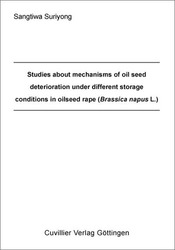| Departments | |
|---|---|
| Book Series (96) |
1381
|
| Nachhaltigkeit |
3
|
| Gesundheitswesen |
1
|
| Humanities |
2370
|
| Natural Sciences |
5408
|
| Mathematics | 229 |
| Informatics | 319 |
| Physics | 980 |
| Chemistry | 1364 |
| Geosciences | 131 |
| Human medicine | 243 |
| Stomatology | 10 |
| Veterinary medicine | 108 |
| Pharmacy | 147 |
| Biology | 835 |
| Biochemistry, molecular biology, gene technology | 121 |
| Biophysics | 25 |
| Domestic and nutritional science | 45 |
| Agricultural science | 1005 |
| Forest science | 201 |
| Horticultural science | 20 |
| Environmental research, ecology and landscape conservation | 148 |
| Engineering |
1795
|
| Common |
98
|
|
Leitlinien Unfallchirurgie
5. Auflage bestellen |
|
Advanced Search
Studies about mechanisms of oil seed deterioration under different storage conditions in oilseed rape (Brassica napus L.) (English shop)
Sangtiwa Suriyong (Author)Preview
Table of Contents, Datei (26 KB)
Extract, Datei (78 KB)
The main objectives of these investigations were to explore the effect of storage temperature on seed qualities of different rapeseed cultivars. In addition, the biochemical changes of rapeseeds with particular consideration of the activities of scavenging enzymes and antioxidants were determined. The storage experiment was conducted during two years. In 2004, three cultivars (Express, Maplus and Viking) were stored at 15 and 25°C for 90 days and in 2005 the same experiment was carried out with the cvs. Aragon, Marcant and Viking at 15°C and 33°C. From the results, there was a clear relationship between moisture content (MC) and oil content of the seeds in relation to storability. Storing rapeseeds (MC<70 g kg-1) in a water resistant container such airtight of plastic bag at 15°C and 25°C had no significant effect on seed viability and vigour. However, storing seeds with MC more than 80 g kg-1 at 25°C had a slightly effect on the germination percentage. Storage at high temperature (33°C) and MC more than 75 g kg-1 led to rapeseed deterioration. During storage, the oxidation of unsaturated fatty acids occurred. Significant changes of these fatty acids were found in high erucic acid rapeseeds stored at all conditions. A storage temperature of 33°C significantly affected the formation of lipid peroxide products and the activity of antioxidative enzymes in rapeseed. The level of peroxide value caused by lipid peroxidation was confirmed to be a useful indicator of oil seed quality. In addition, malondialdehyde content in the deteriorated seed had a positive correlation with lipoxygenase activity during storage. Peroxidase (POX) was not affected in rapeseeds stored at 15 and 25°C and it was slightly changed at 33°C. The capability of POX to detoxify active oxygen species decreased with seed aging. The ascorbate peroxidase (APX) activity was positively correlated with the seed moisture content. The activity of catalase (CAT) was significantly affected at a storage temperature of 33°C, particularly in low erucic acid rape (cvs. Aragon and Viking). In contrast, the high erucic acid rapeseeds cvs. Maplus and Marcant showed a non-significant difference of APX and CAT activity during storage. Tocopherols were also involved in the storability and the content increased in the seed stored at all conditions. The study concluded that initial seed moisture content and storage conditions, influenced seed quality and antioxidative enzymes activities, which contributed to biochemical changes in oilseed rape during storage.
| ISBN-13 (Printausgabe) | 3867273162 |
| ISBN-13 (Hard Copy) | 9783867273169 |
| ISBN-13 (eBook) | 9783736923164 |
| Final Book Format | A5 |
| Language | English |
| Page Number | 120 |
| Lamination of Cover | glossy |
| Edition | 1 |
| Volume | 0 |
| Publication Place | Göttingen |
| Place of Dissertation | Göttingen |
| Publication Date | 2007-07-27 |
| General Categorization | Dissertation |
| Departments |
Agricultural science
|
| Keywords | rapeseed, temperature, storage, deterioration, seed quality, biochemical change, scavenging enzyme. |








